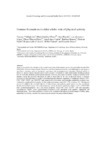Immune biomarkers in older adults: role of physical activity

View/
Use this link to cite
http://hdl.handle.net/2183/19589Collections
- Investigación (FCS) [1293]
Metadata
Show full item recordTitle
Immune biomarkers in older adults: role of physical activityAuthor(s)
Date
2017-05-19Citation
Valdiglesias V, Sánchez-Flores M, Maseda A, Lorenzo-López L, Marcos-Pérez D, López-Cortón A, Strasser B, Fuchs D, Laffon B, Millán-Calenti JC, Pásaro E. Immune biomarkers in older adults: role of physical activity. J Toxicol Environ Health A. 2017;80(13-15):605-620.
Abstract
[Abstract] Aging is associated with a decline in the normal functioning of the immune system. Several studies described the relationship between immunological alterations, including immunosenescence and inflammation, and aging or age-related outcomes, such as sarcopenia, depression, and neurodegenerative disorders. Physical activity is known to improve muscle function and to exert a number of benefits on older adult health, including reduced risk for heart and metabolic system chronic diseases. However, the positive influence of physical activity on the immune system has not been elucidated. In order to shed light on the role of physical activity in immune responses of older individuals, a number of immunological parameters comprising % lymphocyte subsets (CD3+, CD4+, CD8+, CD19+, and CD16+56+) and serum levels of neopterin and tryptophan metabolism products were evaluated in peripheral blood samples of older adults performing normal (N = 170) or reduced (N = 89) physical activity. In addition, the potential influence of other clinical and epidemiological factors was also considered. Results showed that subjects with reduced physical activity displayed significantly higher levels of CD4+/CD8+ ratio, kynurenine/tryptophan ratio, and serum neopterin, along with lower %CD19+ cells and tryptophan concentrations. Further, some immunological biomarkers were associated with cognitive impairment and functional status. These data contribute to reinforce the postulation that physical activity supports healthy aging, particularly by helping to protect the immunological system from aging-related changes.
Description
3rd International Conference on Occupational & Environmental Toxicology/3rd Ibero-American Meeting on Toxicology and Environmental Health International, 21-23 June 2016, Porto, Portugal
Editor version
Rights
This is an accepted manuscript of an article published by Taylor & Francis in "Journal of Toxicology and Environmental Health, Part A", avaliable online at Taylor & Francis Online
ISSN
1528-7394





